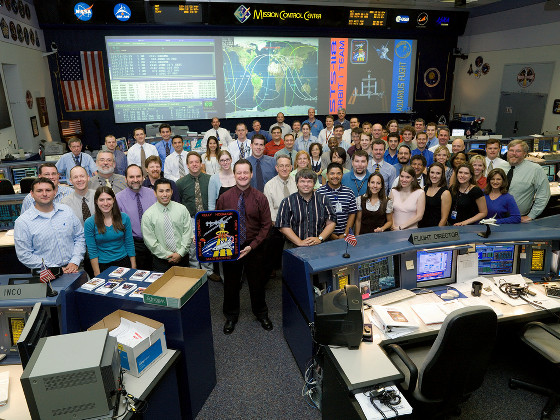This is NASA-style work technique, 'Rule 100 that project managers should follow' will be released

by
The overall responsibility for project planning and execution, called the project manager , was collected by Jerry Madden, deputy director of NASA's Goddard Space Flight Center, from sources of unknown origin for many years. 100 rules that can be called 'knowledge as a project manager' have been released as a PDF file. It is a rule that seems to be very useful not only as a project manager but also for those who manage work and groups.
One Hundred Rules for NASA Project Managers-100-rules-for-nasa-project-managers.pdf
(PDF file) https://www.projectsmart.co.uk/white-papers/100-rules-for-nasa-project-managers.pdf
◆ Project manager

by
01:
Project managers should visit government officials and vendors who have created something for their project to get to know the project manager or team they are working with. A face-to-face visit is the best way to show that you are interested in the work of the other person and to build a relationship of trust.
02: 02:
The project manager understands what kind of salary system the contracted contractor has, what kind of financial system it has, what the corporate culture and culture are, etc., 'What is the motivation of the contractors?' Must know.
03: 03:
Management tools have changed, but the underlying principles haven't changed. All you have to do is find the right people to work with and pave the way for them.
04: 04:
Make transactions fairly, no matter who you are. Since the universe is not a 'large playground,' the members who work do not change more than they think. It's better to treat someone you respect than someone who hates you.
05:
People of all genders can be project managers, even if they have flaws, are sneaky, or are extremely disliked. But you can't be a soulless person, a person who puts off work, or a person who is undecided.
06:
A pleasant project manager is someone who is willing to make mistakes and is waiting for the next challenge. Being stable is not always the case in project management.
07:
New managers face the situation that 'everyone wants to solve their problems.' It's a scene where you might be wondering if you can do something, but if you're an old manager, senior managers have told you, 'Solve your problems yourself, because you're hiring you for that.' It's just the beginning.
08: 08:
Fast work is not always good. You need to take the time to understand the consequences of your actions.
09: 09:
When you are above others, you must know what you want to do, even if you don't know how to work. If you don't know, understand your wishes and expectations. Blind leaders tend to be in the circle.
Ten:
It is not always the case that successful managers are good and unsuccessful managers are incompetent. Luck is involved in success or failure, but good luck smiles at a talented manager who works hard.
11:
Never retaliate against someone who disregards the project. Retaliation does not produce good results and reduces you to the same level as your opponent. On the contrary, it can eventually leave a scratch on the project.
12:
Don't be too selfish by sticking to your position. Be careful especially when your subordinates say 'you are wrong'. You should develop an attitude that allows project members to say that the manager's decision is wrong.
13:
When a person who was a system engineer or financial manager becomes a manager, he or she may become a surgeon who wants to perform his own surgery.
14:
The success of the majority of managers is based on the skill and patience of their staff.
◆ Early work

by
15:
The seeds of the problem are sown from the beginning, and the problems of the project and the evaluation of the failed project may be at the starting point. Keep in mind that getting started is one of the most important parts of a project.
◆ Communication
16:
Good communication and 'early alert' are necessary to cooperate. This means that the plan change is immediately communicated to the partner even in the early stages or even rumors. A project manager who tells his partner after the situation is in the final stages is not 'honest' and will be treated by his partner.
17:
The best way to understand personal and technical issues is to talk to the right people. Lack of the right level of conversation is fatal.
18:
Many meetings are conducted in English, but some do not speak English as their mother tongue. It is important to have a conversation so that you do not misunderstand what is being said.
19:
It doesn't matter if you don't understand the local language when managing an area. Liberal arts are essential for modern managers, and there are many courses where you can learn how to communicate, so please understand what is being said and written.
◆ People

by Joe Cascio
20:
It is impossible to monitor everything. Managers monitor 'people' and need to let them know that 'managers don't approve of odd jobs.'
twenty one:
Some older managers prioritize selfishness over work. However, modern managers tend to care more about shape than content. Look at things from two perspectives to see what's right.
twenty two:
It is not any book reviews or materials that are important to making a good product, but a good technician, a good inspector, and a few bosses.
twenty three:
The root of the problem lies in the person, but it is rare for the person to admit it. Get to know the people who work on the project to find out what the real weaknesses are.
twenty four:
Please note that workaholics can be damaged in a short amount of time. Excessive burden can burn people out, but it is very difficult to decide what is 'excessive'. Make sure that the amount of work done by the worker does not exceed 1.25 to 1.5 times the normal amount, and that you get enough rest.
twenty five:
Internal support should be at the lowest level.
26:
Tell people who say 'I don't see anything', 'I don't ask anything', or 'I don't analyze' to move.
27:
Personal time is very important. Understand the value of others' time as a careful manager. It is also the manager's job to protect the staff from unnecessary work.
28:
Managers who just monitor their work and never help do not seem to understand what is happening. The key to excellence is participation.
29:
In order to motivate you to work, it is helpful not only to allocate good work, but also to sometimes praise and give awards.
30:
Showing off your work is a sign of incompetence.
31:
There are rare times in a specialized field where 'only one person can work'. These people should be treated with care, but let them do the work and get it done as soon as possible. If someone else is in charge, it will take two to three times as long and the finish will be substandard.
32:
There is a reason for people to do something. Many people want to do a good job, and the problem with those who don't do a good job may not be 'what is desired'.
33:
If you have a problem that can only be solved with the help of someone else, you should suggest that you help people.
◆ Reviews and reports

by Marwa Morgan
34:
NASA has project evaluators and an established evaluation system. The system will continue to exist, so find a way to get the most out of it and work to your advantage.
35:
The number of reviews has increased, but the information has not been carried over. With this in mind, once you've created a set of presentation materials, all you have to do is shuffle the content.
36:
Don't try to hide anything from the evaluator because it's trusted. It's important to expose everything, whether it's pits or pimples, but not to make excuses. Please show only the facts.
37:
External evaluations are done at the worst possible timing. Therefore, it is important to update the data daily so that you can react immediately. Failure to do so will result in dismissal.
38:
Do not undermine the value of staff, such as withdrawing work decisions at civic meetings. Even if you instruct a change, do not take responsibility for what was done away from the staff.
39:
The rating is neither for the rating nor for the evaluator. If the evaluated person learns nothing from it, the evaluation is a failure.
40:
According to one study, a meeting with more than 12 participants would waste some time. Work meetings should be attended by up to 6 people, and meetings with more people should be aimed at communicating information.
41:
The amount of evaluations and reports is inversely proportional to the degree to which senior management understands the project. In other words, the project requires external reports and evaluations that are not understood. In an environment where there is an average boss who is not familiar with the activities of the project, it is necessary to prepare data that is simple and clear enough to be understood by monkeys.
42:
It is a well-known fact that managers who rely solely on paperwork, such as activity reports, fail.
43:
Documents are not a substitute for knowledge. It is knowledge that thinks about what happened in the field and makes proposals, and static documents are rapidly being left behind from the times.
44:
Don't think you can shorten your annual report just because you publish it monthly. If management understands how they work each month, they don't need an annual report in the first place.
45:
There are thousands of projects, and senior executives need to know hundreds of projects. Abbreviations should be avoided unless they are intended to confuse the other person.
46:
It's often much easier to make a ridiculous document than to argue for the need for a ridiculous document. Only contend for global issues that will save your future work.
◆ About contractors and construction

by
47:
Oversight of the vendor is not the job of the manager, but the manager must take overall command. When paying bonuses, government officials such as managers should make efforts so that the contractor can work according to the schedule and check whether it is doing a good job. If the work of the contractor does not go well, the result of the project manager will be low after all.
48:
Bonuses are a useful tool for controlling both, as the visible grades give you an idea of the status of the project and the management skills of both the contractor and the government. Grades should be checked using the Project Management System (PMS), but if grades are consistently poor, senior management must intervene to clarify the reason and the PMS matches the actual grades. Even if you don't, senior management needs to move and think about why.
49:
The willingness of construction workers to work is very important to government managers so that they don't want to buy cars made by moody workers or planes made by unmotivated engineers. The project manager should play a role in motivating the people involved in the project.
50:
It's good to be friendly with the vendor, but being friends with the vendor is extremely dangerous in terms of objectivity.
51:
Merchants tend to have one-on-one contact with your staff. Remember that at least one person loses staff each year.
52:
Contractors tend to assess who the other government official is and allocate personnel to the project based on that assessment. Therefore, if they evaluate that 'this manager is a idiot', inferior personnel will be sent to the project.
53:
The basic rule is that 'customers are always right', but if you ignore all the vendor's plans and push your own way, the cost will increase. So the basic principle is, 'Unless it's too expensive or flawed, we won't change the vendor's plan.'
54: 54:
The job of the project manager is to please the customer. Make sure the people you work with know that 'do not flatter, work on schedules and costs, and make good products will please managers', otherwise eliminate them.
◆ Engineers and scientists

by University of Michigan School of Natural Resources & Environment
55: 55:
Over-engineering is common because engineers like puzzles and mazes. Let them keep a simple design.
56:
Engineers are optimistic by nature, so they don't realize they're in trouble. Read the signs of trouble, paying attention to cost reductions and schedule changes.
57: 57:
Taking into account vendors and developers, the project requires 5-10 system engineers. This is a powerful person to solve the problem.
58:
Many managers forget that 'scientists are customers and have easier access to senior managers than they do' because they 'contract for a project.'
59:
Scientists are rational. If they believe that the manager will tell the truth, including the unfavorable facts that the plan will be reduced, they will work together.
◆ Hardware

by
60:
In the ever-changing space business, those who make next-generation hardware have never seen hardware from the previous era. Note that the operating environment has changed and in many cases the person checking the unit does not understand the unit itself or the testing tools.
61:
Many tools don't work as the designer planned. This is because the design wasn't good, the designer's intentions weren't understood, or the component specs weren't understood.
◆ Components and software
62:
It is a big mistake not to use the current technology as represented by computers. But forgetting that computers imitate human thinking is a bigger mistake.
63:
With the majority of flight mission cost calculations, quality control, verification procedures, scope creeks, and other hardware parameters now undertaken by the software and additional features, it's very difficult to say 'no flaws'. .. Be sure to run the base system first and then add options. As an emergency measure, keep the old version, even if you are confident that the latest version will work.
64:
Knowledge is often revised by tests and simulations, but computers can retain hidden flaws, such as lack of input data.
65:
In the olden days, engineers had hands-on experience, and engineers understood how electronics work and what they are trying to do. But now it is the computer that knows it with certainty.
◆ Senior managers, program offices, etc.

by
66:
Ask if you have any doubts about the behavior of senior management and feel that you should know why. You will get a surprising answer.
67:
Know your management. Some senior executives like jokes, while others just like the jokes they say.
68:
Remember that it is the boss who has the right to make decisions. If you think the boss is wrong, you should tell it, but if you tell it and the boss doesn't change your decision, follow the boss's decision and do your best to succeed.
69:
Don't let the administrator decide what you can decide.
70:
Project managers and program managers should act like teams. Program managers are supporters of project managers at NASA headquarters and are the ones who help them succeed.
71:
Know who makes the decisions in the program. You may be an administrator, a deputy secretary, or a scientist, but no matter who you are, communicate somewhere.
◆ Program planning / budgeting / estimation

by
72:
Today, we push the latest technology, adjust it to stay within budget, take risks, and try to do the project in time so that it doesn't fail. For some reason, these are done consistently if you keep a pre-established schedule and budget.
73:
Many projects done in the past have exceeded schedules not because of failure but because of poor predictions. It costs money to make better predictions, but it will boost NASA's reputation. Better evaluation is essential in the current environment.
74:
All problems will be resolved in due course. Please make a schedule with plenty of time in case of emergency. Otherwise you will have another manager in your position for the next project.
75:
NASA in the past has pushed the boundaries of science and technology, so it didn't matter if the project scope creeped or overrun. On the other hand, scope creep is a fatal mistake in the new NASA, as all projects have a fixed price.
76:
Find out about the people at the center you work for and the people at other centers. Usually, even if the center is different, just calling out will help you surprisingly.
77:
There is nothing to keep secret other than the budget information that the president has submitted to Congress. So don't keep the information confidential. It's easier for anyone to see the big picture, so don't hide the information.
78:
NASA programs compete for budget, but they don't attack each other, they sell their strengths.
79:
'Next year' of 'get enough budget next year' is like the 50th year of your career.
◆ Customers
80:
Keep in mind who your customers are and what they want. When we make important changes, we check with the customer.
◆ NASA Business Management Instructions

by Dave King
81:
The NASA Business Administration Instructions are written by another NASA employee who is in a similar position to you. If you find something you don't understand, please challenge the instructions. It is also possible to discard or rewrite the instructions.
◆ Decision
82:
The wrong decisions made early can be compensated for, but the correct decisions made late cannot correct the initial mistakes.
83:
Sometimes doing nothing is the best thing to do. If the project manager always has to solve someone's problem, it's the same as working for 'someone' anymore. There are many situations where you are only required to listen.
84:
Please do not make a decision by looking at the illustrations. Get real-life information such as hardware and blueprints. A lot of wasted time comes from people trying to correct the facts in the illustrations to explain the principles.
◆ Professional ethics and integrity
85:
'Sincerity' means that your subordinates trust you.
86: 86:
When you're in a hurry to get the job done, it's always important to remember 'who you work for.' Exploiting your boss's weaknesses is not in your interest in the long run.
◆ Project management and teamwork

by
87:
Teamwork is required to make a project successful. Many teams have coaches, not bosses, but coaches must always call for play.
88:
Don't make the assumption that 'someone will know' or 'someone will do it without asking'. In stressful work, even the obvious things can be overlooked or ignored.
89:
People who say, 'I can't say what I like or dislike to get things blessed,' don't understand project management. In many cases, it's better to rely on luck than to rely on someone like the one above.
90:
Just as it's hard to tell where the puzzle is when you have only one piece, it's not surprising that an informed team member comes to the wrong conclusion.
91:
Remember that the President, Congress, Office of Management and Budget, NASA Headquarters, Senior Center Management, Customers, everyone has work to do. The job of the project manager is to please them all.
◆ How to avoid and handle failures

by
92:
What to do when you fail
a: Make a timeline of what happened and write everything down, including the obvious.
b: Write down the facts you know and check any thoughts on the facts.
c: Do not discard the data until you know the truth.
d: Don't jump to the results and try to explain what is out of the ordinary. Remember that the wrong conclusion will be the beginning of your next failure.
e: Know when to quit.
93:
Failure is a lesson for the future, and success is also a lesson. Please reproduce the one that worked.
94:
Mistakes are fine, but failures are. Failure to recover from mistakes is a failure, so when making high-risk items or making high-risk plans, take measures against accidents and prepare another approach.
95:
So far, no project has been tested and certified without any problems. Only time and preparation are safeguards against problems.
96:
Experience is good, but experimentation is better. 'Knowing about something' does not mean 'proving it.'
97:
You need to hesitate to fail to succeed, but you also have to learn the techniques to recover. Knowing who can help is one of the techniques.
98:
One of the benefits of early NASA was that everyone knew that 'the facts they took for granted could be wrong.'
99:
Redundancy is fiction in hardware, and if one fails, the other fails. Keep in mind that 'hardware is the only thing in a build, and missions need to succeed.'
100:
Make no excuses and show a plan for your next action.

by Hartwig HKD
Related Posts:
in Note, Posted by darkhorse_log







